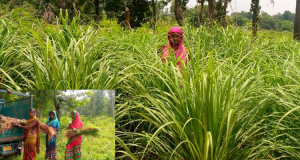 RNS:‘Lemon Grass’ turns as a boon for a few women residing in different villages under Paterwar block, situated on the banks of Damodar river of Bokaro district.
RNS:‘Lemon Grass’ turns as a boon for a few women residing in different villages under Paterwar block, situated on the banks of Damodar river of Bokaro district.
Around 140 women farmers cultivate lemon grass in ten women producer groups on 28 acres of barren land; they have set an example by earning about Rs 3.5 lakh from Lemon Grass cultivation.
These rural women who were troubled for their livelihood a few months ago now have become an inspiration for others.
“We have started cultivation of Lemon Grass through the Jharkhand Opportunities for Harnessing Rural Growth (JOHAR) project under in the year 2020, for the first time in the Kharif season in four producer groups,” said Lal Muni Devi, a woman farmer.
“We were worried about losing money (investments) when we first started farming, but we persisted. Today, our burgeoning harvest is a living testament to our accomplishments,” said Munia, another woman of the farmer group who grows lemon grass.
“When we joined the producer group, we learned how to increase our profit by doing collective farming and collective sale,” said another woman of the farmer group.
“We came up with the idea of growing lemongrass only after extensive discussion and training among the growers’ group members. The main benefit of this farming method is that after five years of planting, the crop does not need to be replanted, and it pays every year,” she said.
JOHAR project is a holistic package of rural livelihoods interventions that work together to enhance and diversify the incomes of targeted rural households across 68 blocks in 17 districts of Jharkhand.
It uses a collectivisation approach and builds on the community institutions platform established by another Government-World Bank initiative, the National Rural Livelihoods Mission, to form producer groups and producer organisations.
JOHAR uses this platform to deliver the interventions package designed to push rural producer households up the value chain.
Cultivation of lemon grass is easily done in less fertile land or even on barren land. Once the plant is planted, profit can be earned by harvesting and selling its leaves 4 to 5 times per year till five years, said an official.
This time, lemon grass saplings have been sold to 10 producing groups by the four producing groups cultivating last year. And the women farmers (who cultivated) have earned an income of about Rs 3.50 lakh, the official said.
Lemon grass is significant because of its fragrant leaves. Steam distillation is used to extract the oil from the leaves, which is rampantly used in cosmetics, soaps, insecticides, and medicines.
Lemon grass is also extensively used as an antioxidant, the official said.
So far 340 women farmers in the district have been connected with the cultivation of lemon grass under the Johar project. Vanopaj Mitra has been trained to provide technical support and suggestions to the farmers, who give continuous training and other advice to these farmers at the village level, he said.
Deputy Commissioner Kuldeep Chaudhary said that Jharkhand State Livelihood Promotion Society under Rural Development Department is implementing the JOHAR project in the district. Rural women are being linked for advanced farming with the help of producer groups through JOHAR.
People are increasing their income by shifting from traditional farming to value addition of forest produce.
Despite having land, women farmers who were unable to cultivate are now earning good profits by growing plants like lemon grass, drumstick, basil by taking technical training and cooperation.



